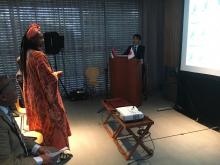Tackling the issues of Ageing Population through Global Partnership
Social problems associated with the ageing of the population can be settled not only by formal services, like social aid, old age pension and health insurance but also through the provision of a wide range of informal cares to support the population including self and family supports and mutual supports in community. Such collaborations can be explored through global partnership and sharing of other countries’ experiences. In this context, a half-day seminar was organized by the Embassy of Japan in Mauritius on Thursday 13th September 2018 at the Residence of the Japanese Ambassador. Following a presentation by Dr Ken Masuda, Associate Professor at Nagasaki University, Japan, on the theme “Challenges of Social Welfare, Long-term Care and Insurance System in Hyper-Aged Japan”, the participants to the seminar, including Dr Laurent Musango, WHO Representative in Mauritius and Mrs Christine Umutoni, United Nations Resident Coordinator and UNDP Representative to Mauritius, had the opportunity to participate in a live discussion.
Dr L. Musango enquired about effective solutions that could be used to address low fertility rate and strengthen health insurance in Mauritius. On the other hand, Ms C. Umutoni highlighted the importance of public-private partnership and global partnership to tackle issues regarding ageing population in Mauritius. Fruitful discussions on how Japanese experts could support Mauritius in the “Assessment of the demographic trends and review and revisit the National Population Policy of the Republic of Mauritius” went on between Dr Musango, Ms C. Umutoni, the Ambassador of Japan H.E. Mr. Yoshiharu Kato and the consultant Dr Ken Masuda. The operationalization of this support will be discussed further in the coming weeks in view of support the Ministry of Health and Quality of Life in addressing the issues of ageing population.
In Mauritius, the epidemiological transition from communicable diseases to non-communicable diseases explained the ageing of the population which resulted from a decreasing in fertility and mortality. The population in Mauritius has peaked and is expected to take a very similar track to that of Japan as its elderly population rate (65+) is expected to reach 31.6%, compared to 32.8% in Japan in 2100. This demographic change will undoubtedly have a huge impact on social services in the future. For instance, in Mauritius, the old dependency rate was three in 1950 and fourteen and 2017. This means that 100 working-age people is supporting fourteen elderly people (65+) in 2017 compared to three in 1950.
It is good to point out that Japan is one of the most ageing countries in the world. Life expectancy at birth is 81 and 87 in male and female, respectively, and the elderly population rate (65+) in Japan was 27.7% in 2017. This condition has triggered a wider range of social problems, such as a rising number of people with dementia, solitary deaths, tragic traffic accidents by elderly drivers and sustainability of pension system. Japan also experienced upsloping trends in percentages of elderly population living alone from 11.2 and 4.3 in 1980 to 21.1 and 13.3 in 2015 in female and male, respectively. As the trends continue, the values are expected to reach 24.5 and 20.8 in 2040. Many other elderlies will be living with their spouses or in facilities (e.g. nursing home) while the proportion of the elderly living with children has halved in the last 50 years. It is to be highlighted that National Health Insurance and Long-term Care Insurance are available and mandatory to all the population in Japan. A concept of the Community-based Integrated Care System was adopted and has been implemented to strengthen public care services by collaborating with informal services including community and family supports.





